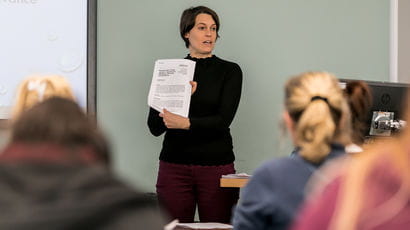Progress review in stages two and three
The assessment of progress in stages two and beyond through the research phase of the research degree, including the submission of evidence of progress, the period of grace and the completion period.
Regulations
The relevant regulations are E14.
Regulations can be viewed in full in the Academic regulations 2025/26 (PDF).
Purpose of the progress review
The progress review provides postgraduate research candidates (PGRs) with formative feedback about your progress at key stages throughout your project. It enables the Doctoral Academy and other university committees to monitor both individual progress and levels of current postgraduate researcher (PGR) activity overall in line with Quality Assurance Agency for Higher Education (QAA) requirements.
Your progression through a research award is dependent on your successful achievement of the progress point relevant to each stage of PGR registration. You are notified of your individual progress review dates by the Doctoral Academy upon registration. Please ensure you keep a copy of these dates and refer to them regularly, as any missed deadlines could result in withdrawal from study.
Progress Review – Stages 2 and 3 (and 4 if applicable)
A progress review is carried out to ensure that satisfactory progress on the project is being maintained and to address any issues or concerns raised by the PGR or supervisor. A review meeting is held between the PGR, Director of Studies (DoS), and an independent reviewer at which submitted evidence of progress is discussed and objectives for the coming stage are identified.
Procedures about the progress review at stages two and three
Purpose and how progress is measured
This procedure links to regulation E12.
- The purpose of progress review is to demonstrate that the Postgraduate Researcher (PGR) candidate is continuing to make satisfactory progress with their project and is on track to complete and submit their work for final assessment on time. It also enables reviewers to provide formative feedback to the candidate to support ongoing progress and identify and agree appropriate targets for the next stage of the project.
- The University uses the UWE Bristol Doctoral/MPhil qualification descriptors (see regulation E3) as the benchmark for measuring progress. An independent reviewer and the candidate’s DoS (or other member of the supervisory team where appropriate) will consider evidence of progress submitted by the PGR from the approved list below and discuss this with the candidate at the progress review meeting.
- The progress review meeting may take place face-to-face or online as long as all participants agree on the chosen format.
- PGR candidates must continue to demonstrate satisfactory progress to be able to continue with the next stage of their research degree.
- The agreed level of future supervision will also be discussed at the relevant progress review immediately preceding the completion period (normally PR3), and the candidate must successfully complete this review before they can proceed to the completion period.
Milestone objectives
This procedure links to regulation E12.
- The reviewers must be confident that the PGR candidate, supported by their supervisory team, has done/is continuing to do the following:
- Is actively engaged in working on the research project and continues to make progress in line with objectives agreed at confirmation of the project and reviewed and/or amended at progression examination or subsequent progress review points.
- Has taken action to progress any specific targets or objectives agreed at the previous review point.
- Has a realistic plan of the work remaining that will be required to complete their project on time.
- In the case of PhD awards, where the candidate has indicated that they intend to incorporate research outputs in their final thesis submission, that they have generated sufficient outputs/material thus far to justify this approach, that they have a realistic plan to produce any further research outputs prior to submission, and that they will be able to complete the project on time.
- In the case of DPhil/MPhil by publication awards, that the candidate will have appropriate published outputs, when combined with the critical commentary, to demonstrate the requirements and attributes of the relevant award descriptor (see regulation E3) by the time the final submission is made.
- The project continues to be compliant with ethical approval where this is a requirement, and that research data management plan remains appropriate.
- The candidate is aware of the importance of academic integrity and author authenticity, intellectual property, and third-party copyright permission requirements within the work that they are producing towards their final submission.
Selection of independent reviewers
This procedure links to regulation E14.
- The independent reviewer at stage two and beyond will normally be one of the examiners appointed at progression examination. If the DoS wishes a different reviewer to be appointed, this must be approved using the appropriate college or school level process.
- Independent reviewers will be:
- a member of UWE Bristol academic staff (or equivalent in the case of partner academic institutions) who is independent of the research project, the candidate and the supervisory team
- an experienced researcher with a general understanding of the candidate’s chosen project field but need not be a leading subject expert in that field.
The timing of the review
- Deadlines for completion of progress reviews will be in accordance with the dates specified in the agreed terms and conditions for each PGR researcher, including any subsequent adjustment due to suspension of active study.
- Progress reviews for stage two should be fully completed by 24 months for full-time PGRs or 36 months for part-time PGRs and as per published programme for Professional Doctorate awards.
- Progress reviews for stage three should be fully completed by 36 months for full-time PGRs or 54 months for part-time PGRs and as per published programme for Professional Doctorate awards.
- Exceptionally, subsequent progress reviews, for part-time registration only, should be at the same intervals as for stages two and three and completed by the end of every 18 months of subsequent registration prior to final submission.
Responsibilities of the PGR candidate
- To complete the relevant form and submit evidence of progress chosen after discussion with the DoS from the list of options below by the deadline indicated in terms and conditions for their award registration.
- To ensure that any third-party material included in any submitted work (material generated or owned by someone else) is appropriately attributed in the body of the submitted work, as well as in any bibliography.
- To attend a progress review meeting on the date and at the time agreed by the DoS.
- If the candidate has disclosed a disability or ongoing health condition for which reasonable adjustments have been agreed, they must discuss any support needs for the review with their DoS and the Doctoral Academy as early as possible to ensure that specific arrangements can be made.
- In the case of an unsatisfactory outcome where resubmission is required, submit additional or amended evidence of progress to the deadline required. The independent reviewer and the DoS will provide oral feedback on the day of the review and written feedback (via the notification of outcome) as to the additional work/evidence needed.
Evidence of progress
This procedure links to regulation E12.
- One item from the following list:
- At stage two:
- thesis outline or
- synthesis of outputs/data/activities or
- presentation on progress or
- presentation of outputs or
- draft thesis chapter.
- At stage three:
- draft thesis/part thesis or
- presentation of findings or
- other evidence that demonstrates that timely completion of the project and submission of the thesis/final work will occur.
- At stage two:
- A published paper(s) may be submitted as supplementary evidence at stage three (PhD, MPhil awards), but the candidate must demonstrate how this will contribute to the intended thesis submission as a whole and set the papers(s) in the context of other draft thesis material submitted.
- The candidate and their DoS should agree in advance what kind of material from the approved range of options should be submitted to best reflect the nature of the project, the research culture of its disciplinary context, and any explicit or commonly accepted School expectations.
- The range of approved options is designed to reflect the material that a PGR candidate might normally be expected to produce as part of the work plan for their project at that stage, rather than to create additional workload. Candidates should not be required to draft extensive material from scratch unless it has direct and transferable relevance or demonstrable benefit to the completion of the project.
- Unless there is a clearly stated rationale to justify the contrary (for example, a PhD candidate who is intending to include research outputs in the thesis), only one representative example of evidence should be submitted, and the candidate should be ready to discuss how this demonstrates their progress overall. Where a published paper/publishable paper is submitted the PGR will be expected to show how this will contribute to the final thesis/critical commentary. PGR candidates should avoid overloading reviewers with multiple or ancillary evidence.
- Professional doctorate candidates should submit evidence appropriate to their award. Candidates may select the draft thesis/part thesis at stage two review where the requirements of the Professional Doctorate award permit this. In such cases this will then be deemed to be the equivalent of stage three review.
- DPhil/MPhil by publication candidates who have not yet made their final submission will be required to undergo progress review at the end of each stage of registration until final submission. Evidence of progress for the review will need to be appropriate to the nature of the award and the stage of progress that the candidate has reached, for example, an updated publication plan for any final outputs expected and/or a draft of the critical commentary.
Responsibilities of the Director of Studies
- To ensure that an independent reviewer is in place for progress review points subsequent to the progression examination. Supervisors are normally expected to act as an independent reviewer for other PGRs in proportion to the number of PGRs which they themselves supervise.
- To discuss with the PGR at an early stage what the relevant evidence submitted will be. It is expected that the evidence submitted should draw on work already carried out by the PGR rather than produced in addition to existing work/outputs – it should not place an additional or unreasonable burden upon the PGR.
- Where there is a College/School or disciplinary expectation about the kind of evidence that will normally be submitted, the DoS must ensure that the PGR is aware of this. If there is a clear rationale for selecting a different form of evidence (still chosen from the approved list), the DoS must ensure that the independent reviewer is aware of this in good time prior to the review meeting.
- If there is disagreement between the DoS and reviewer as to the type of evidence to be submitted, the DoS should seek advice from their PGR Lead or equivalent or the PGR Director for the College.
- To organise the date and practical arrangements for the progress review meeting in accordance with the deadlines in the PGR candidate’s terms and conditions of registration, such that the whole review process can be completed in line with the relevant timings (see above) and to notify the attendees.
- To discuss with the PGR and the Doctoral Academy any reasonable adjustments or other support needs as soon as possible.
- To ensure that all pre (PRa (DOC)) and post (PRb (DOC)) review reports are completed and submitted to the Doctoral Academy within five days of the review.
- Conduct the progress review meeting with the independent reviewer, bearing in mind the equality and diversity requirements of the University and in accordance with guidance provided by the Doctoral Academy or other relevant UWE Bristol specialist services as appropriate.
- With the independent reviewer, to provide oral feedback to the candidate at the end of the review meeting about their work and progress, and the agreed review outcome.
- In the case of satisfactory progress at stage three progress review, to consider what level of supervision if any the PGR will need to complete the project and submit on time.
The review meeting outcome
- At the end of the review meeting the independent reviewer and the DoS will provide the candidate with oral feedback about their work and progress, and their agreed review outcome.
- The reviewer and DoS will jointly complete the review outcome report (PRb (DOC)) and submit this to the Doctoral Academy within five days of the review meeting.
- This report will contain written feedback and any recommendations for the candidate about their progress and future objectives/work plan.
- If the reviewer and DoS are unable to agree a joint outcome, they will each submit an independent report to the Doctoral Academy for consideration by the appropriate Committee.
- In the case of an ‘unsatisfactory’ outcome the report must also indicate the nature of the additional work or evidence needed at resubmission to demonstrate that the project is back on a satisfactory footing.
- In the case of a successful stage three progress review, the reviewer and DoS will indicate to the candidate in the review meeting and on the completed outcomes report the level of supervision that the candidate should receive as they move into the completion period.
- It is not the purpose of stage three progress review (PR3) to provide a summative assessment of a complete draft thesis or critical commentary. It should establish whether the draft material that PGR candidate has submitted shows sufficient progress to be able to complete the project and submit the finished thesis by the end of the maximum active study period permitted for the award and the level of supervision they will need to do so. PR3 must be satisfactorily completed before the PGR can progress to the grace period/completion stage.
Please note: Separately to the staged progress review process, all PGRs are also required to submit a full draft of their thesis/critical commentary to their supervisory team in good time to receive formative comment and advice on this draft prior to submission for final assessment.
Confirming the outcome of progress review at stages two and three
- The Examination Board will receive the reviewers’ joint outcome report (PRb (DOC)) and confirm the outcome of progress review at stages two and three. The candidate will be notified of this confirmed outcome together with the written feedback and recommendations from the reviewers for the candidate.
- If the independent reviewer and the DoS are unable to agree a joint outcome, the Committee will consider both independent outcome reports and decide the final review outcome.
- In the case of a resubmission outcome due to unsatisfactory progress, the Committee will confirm the details of the resubmitted work/evidence to be submitted required by the reviewers. The candidate will be notified.
- In the case of a satisfactory outcome at stage three, the Committee will confirm the level of ongoing supervision the PGR will need to complete the research project and submit for final assessment. The candidate will be notified.
- Where the Committee confirms that progress remains unsatisfactory after resubmission, the designated Examining Board, Committee or body will confirm the withdrawal of the candidate from the award. The Board will also consider any late personal circumstances applications pertaining to the progress review submitted following a withdrawal decision.
- A candidate may appeal against the decision of the Examining Board only on the grounds that there has been material and significant administrative error or other material irregularity, as set out at University’s Academic Appeals Policy under Regulation D26.
Guidance for PGR candidates submitting research outputs as part of their final PhD or MPhil thesis
- PGR candidates registered for PhD/MPhil awards may opt to incorporate research outputs in ‘the body of work to be assessed’ within the written thesis (see regulation E4) and related procedures for the types of research outputs that are permitted.
- A candidate considering this option should have an early discussion with their DoS, so that this can be incorporated into the plan of work for the project. The candidate should also come to progress review at stage two ready to discuss their research outputs and/or publication plan with reviewers.
- At stage three progress review the evidence of progress submitted must demonstrate that the candidate has generated or will have generated sufficient outputs during their registration on the award to support this approach. For example, details of the research outputs so far and a realistic plan for the production of any further outputs prior to final submission.
- The outputs to be included do not need to have been published at the point the thesis is submitted for final assessment, but they must have been generated during, not prior to, the candidate’s registration on the award and should be in suitably publishable state or otherwise ready for release into the public domain.
- Read the incorporating research outputs in your thesis (PDF) for additional guidance. Within the guidance is a link to a short video for examiners, and candidates are recommended to watch this to gain further insight into the rationale for including research outputs into their thesis.
- This option is not currently available to candidates registered on Professional Doctorate awards, or to PhD/MPhil candidates on approved creative practice focussed programmes whose submission will follow a different format (see regulation E4 and related procedures including Creative practice for MPhil and PhD). It is not available to candidates registered for DPhil/MPhil awards by publication for whom different regulations about submission of publications apply (see regulation E4 and regulation E15 and related procedures).
Please note: the video refers to section 13 of the Graduate School handbook, this relates to regulation E15 and associated procedures of the Doctoral Academy Handbook.
Guidance about the completion period
Period of grace
- Following successful completion of stage three progress review (PR3), PGRs are eligible for a fee-free period of grace. For a full-time PGR this will be three months and for a part-time PGR it will be six months. If the thesis is submitted for final assessment within the grace period then no further tuition fees will be due (this does not include re-examination fees).
- If the thesis is not submitted for final assessment within this period of grace then the PGR will become eligible for a completion fee.
Completion period supervision and fees
- At the PR3 review it will be agreed what level of supervision is still required in order for the PGR to complete their research ready for submission of their thesis for final assessment.
- The level of completion fee will be one of the following:
- Fixed completion fee, without supervision – The PGR must have completed all of their research and be finalising their thesis and therefore not need supervision. As a registered student of the University, they can continue to access general UWE Bristol facilities. The supervisory team must provide comments on a full draft of the thesis prior to submission for final assessment.
- Completion fee with supervision – 40% of current tuition fee entitles the PGR to some supervision, usually with one member of the team.
- Full fee – continued support from the full supervisory team.
- Once it has been agreed that a PGR is eligible for a completion fee they will remain on this status until they submit their thesis for final assessment, or the maximum active period for the award expires.
- If a PGR or supervisory team feels that more or less supervision is required, an application can be made to the designated Committee (normally the College Research Degrees Committee (CRDC)) to reduce/increase the completion fee with or without supervision.
- The ‘completion fee without supervision’ is a set annual payment and there is no refund available if the PGR submits early.
- The ‘completion fee with supervision’ can be paid in monthly instalments, if requested, and in agreement with Credit Control, and is payable until submission of the thesis for final assessment.
Please note: PGRs who reach the end of their active study period without having submitted for final assessment, and who have not submitted a valid personal circumstances application will be withdrawn and no award will be made.
Further advice about the completion period and completion fees is available from the Doctoral Academy.
Doctoral Academy Handbook sections

Introduction
Read an introduction to the UWE Bristol Doctoral Academy Handbook.

Research degree awards
The different postgraduate research awards available and the qualification descriptors they align to.

Student registration
The registration process and periods of active study for postgraduate research degrees.

Professional development and training requirements
Professional development and research training requirements for postgraduate researchers.

Supervision
The role and responsibilities of the supervisory team for postgraduate research.

Research project
The confirmation of the research project (CP1) is where arrangements for the start of the project are confirmed.

Research governance
Research governance for postgraduate research degrees, includes ethics, research data management, intellectual property, conduct and assessment offences.

Personal circumstances
Personal circumstances, reasonable adjustments and other support available to postgraduate researchers.

Progression examination: stage one
The progression examination viva and report submission.

Progress review: stages two and three
The progress review, options for evidence of progress and eligibility for the completion period.

Final submission
Requirements for preparing and formatting the final submission for Doctoral or MPhil level research awards.

Examiners
The University’s expectations of postgraduate research degree examiners and Independent Chairs.

Final examination
The final assessment for Doctoral or MPhil level awards by research.

Higher doctorates
The regulations and processes for eligibility, consideration, submission and awarding of higher doctorate awards.
